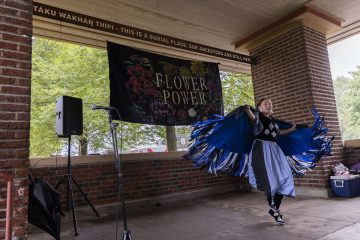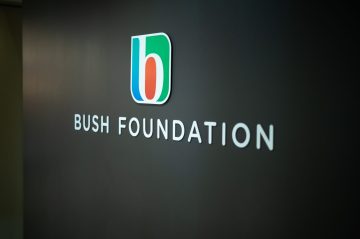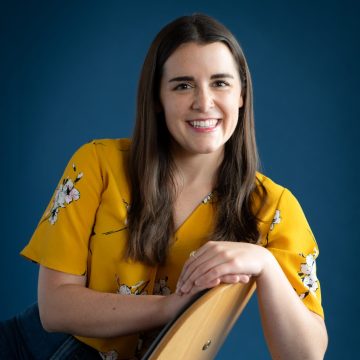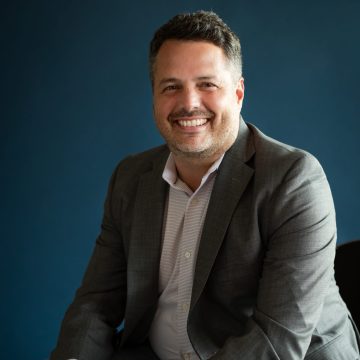Story
Voice of the People
Oyate Hotanin is reimagining justice in the justice system
DATE
December 13, 2021

By Amy Nelson
Flowers, art and beauty have a unique way of bringing people together. For Oyate Hotanin, a non-profit Indigenous arts and social justice organization, that truth was evident at its first Flower Power event in 2017.
Laura LaBlanc, Oyate Hotanin’s director of operations, describes the connection through a story from the event, which uses public art to honor those who have been impacted by the prison-industrial complex. It was still early in the day and already more than 20 people had gathered in St. Paul’s Indian Mounds Regional Park. The park is home to six Native American burial mounds, which Oyate Hotanin recognizes as sacred.
The attendees had just started meeting each other and creating floral art when two St. Paul police officers dressed in casual attire but with guns in holsters started approaching the group with their arms behind their backs. Alarm grew among the attendees, a ripple of concern spread through the group, eyebrows were raised, the chatter went silent. LaBlanc recognized the officers and knew they were coming — she had invited them — but many of the first-time attendees did not know them. And some in the crowd had painful memories of traumatic interactions with police in the past.
Finally, as the officers topped the hill where the artists were gathered, they offered up their peace tokens from behind their backs. They revealed fistfuls of flowers for the artists to use, and smiles bloomed across many faces. A wave of relief spread through the group, and a connection was created.
A Vision of Justice
Flower Power is one arm of Oyate Hotanin’s IN Equality program, which uses public art, coalition building and policy advocacy to transform the Ramsey County juvenile justice system. IN Equality’s goal is to put youth and families at the center of problem solving and move from a “tough-on-crime” mentality to one that is smart on services.
“We envision a society where the divide and hostility between our communities and representatives of the criminal justice system has been erased,” LaBlanc wrote in a grant proposal for the IN Equality program, funded by the Bush Foundation’s Community Innovation grant program. In this vision, “rather than fearing encounters with the police, we are true partners in problem solving. We are working towards a future where the system’s emphasis has shifted from ‘criminal’ to ‘justice’ and the impact of historic trauma is recognized, acknowledged, and addressed, rather than being compounded by new injustices. One where the system views our young adults through the same forgiving lens it often uses for young white adults, and values relationships, community, and healing over punishment and sanctions.”
In everything they do, IN Equality uses collective leadership through what respected elder John Poupart calls a “bold, old” strategy. Their process involves listening to the community around them and making decisions based on what the collective voice is saying, and they’re always looking for new ways to bring people to the table.
IN Equality uses this community approach to act as a bridge between community members and the criminal justice system. The Flower Power public art event engages the community to show the impact of mass incarceration in a way that raises visibility and builds solidarity, which helps build the foundation for political reform.
As a leadership coalition, IN Equality brings together people with firsthand experience of the criminal justice system to lead the call for change and reckoning, knowing that those most affected by the system are best equipped to offer transformative solutions. As a policy advocate, IN Equality has helped commission and produce several policy briefs — drawing on extensive community engagement — that have led to policy change in Ramsey County.
Successes So Far
Through its work, IN Equality has helped stop the construction of a proposed juvenile correctional center, close Ramsey County’s Boys Totem Town residential reform school, and oppose a data-sharing agreement called the Joint Powers Agreement.
Before the IN Equality program started, 90 to 100 youth were being confined in juvenile detention centers in Ramsey County. Nearly 3,000 children were entangled in the system every year, mostly children of color. Data from the Sentencing Project shows that Minnesota has a significant Black/white disparity, with Black youth’s placement rate at 648 per 100,000, compared with white youth’s placement rate of 75 per 100,000. Youth of color must deal with significant and harmful engagement with the juvenile justice system. While white youth are often escorted home or provided diversion opportunities, youth of color are not.
LaBlanc explains, “You can’t incarcerate that large segment of a community and not have huge impacts on our family wellbeing, their own wellbeing, their future hope and opportunities.”
In 2005, Ramsey County committed itself to addressing the disproportionately high confinement of minorities and implemented the Juvenile Detention Alternatives Initiative (JDAI), led by Toni Carter, Commissioner of Ramsey County. Oyate Hotanin added their voice to the JDAI and established IN Equality in 2015 to embed an innovative partnership model between community members and juvenile justice system leaders in Ramsey County.
A direct result of this partnership is staggering: use of detention has dropped 85% since 2005, and out-of-home displacements have dropped 74% since 2015.
“IN Equality has done significant work to close juvenile detention centers while also preventing a joint county facility from being opened,” says Ramla Bile, a grantmaking officer with the Bush Foundation. “They were educating about the harm these centers place on young people before there was general awareness of the issue or a movement toward reform.”
Bile explains that IN Equality seeks out community input and has actively added community liaisons to be the “voice of the people” in Ramsey County. These community voices often challenge traditional thinking and raise awareness of unintentional outcomes. And they are connected to and informed by an even broader community coalition.
Bile says, “Elected officials and staff at public agencies that are friendly toward the vision of decriminalizing communities need community voices and wisdom to inform what that looks like. In fact, one county staff person said, ‘Comfort in reform is not good, and IN Equality is pushing the system as far as possible.’”
Ann Ploetz, an attorney in the Ramsey County Attorney’s office, agrees. “There’s friction all the time, but that kind of friction means that we’re getting at all of the issues,” she says.
The Ramsey County Attorney’s Office, which is engaged in work to reimagine youth justice, has worked with members of IN Equality for many years. Ploetz stresses the importance of including the community’s voice in co-designing a new model of justice that will actually provide justice to all.
Recognizing and acknowledging the harm that systems have caused to some communities in the justice system is necessary, Ploetz says. IN Equality is committed to making sure this point of view is heard. Ploetz explains that what some who work for the justice system may view as a useful tool may look very different to those in the community who have been harmed by that tool in the past. “It is imperative that we listen and understand to do better,” she says. She adds that “IN Equality is a persistent, steadfast voice for our justice-impacted community; they are always there to raise community perspectives and to make sure there is room at the table for the community point of view.”
A Model Nationwide
What started with Oyate Hotanin’s and other key community members’ work with one county has resulted in a model for others across the nation.
“What IN Equality is doing in partnership with the Ramsey County Attorney’s Office and community organizations is groundbreaking,” Bile says. “County-level reforms are a way to bring about lasting change that is being sought out by both sides — those who are a part of the system and people who have been harmed by it. This work has potential to transform the juvenile justice system nationwide.”
Why start on a county level? “The county has power to make a lot of critical decisions that impact the number of young people that are in detention, and who gets a second chance and who doesn’t,” Bile explains. So while criminal justice is a multi-layered, cross-jurisdictional system involving city, county, state, and federal units of government, the county is a major player in the technology of mass incarceration and often functions with a great deal of local discretion. County players include the county attorney, judges, probation officers, detention centers, jails, and more.
The county attorney also has a role in influencing local police, what crimes are prioritized, what neighborhoods are policed more, and how aggressive plea agreements and sentencing can be.
“Reforms at the county level present a unique opportunity to tackle criminal justice transformation in a focused and strategic way,” Bile says.
In 2021, Oyate Hotanin received an additional Bush Foundation grant to support an outgrowth of IN Equality’s work. They will explore alternatives to incarceration by developing a reparative circle method based on Native American thinking and practices, and hope to eventually expand to also work with tribal courts.
“There are big, lasting outcomes with the work we’ve done,” says Crystal Norcross, Oyate Hotanin’s board chair and a member of Ramsey County’s racial and health equity team. “Oyate Hotanin’ means ‘voice of the people,’ and we are trying hard to live by that name.”
Jaida Grey Eagle is an Oglala Lakota artist currently living in St. Paul. She is a photojournalist, producer, beadwork artist and writer. She is a Report for America Fellow with the Sahan Journal covering communities of color in the Twin Cities and also is researching Indigenous photography at the Minneapolis Institute of Arts as an ongoing former Curatorial Fellow. She holds her bachelor’s degree of fine arts emphasizing fine art photography from the Institute of American Indian Arts in Santa Fe, NM.
Amy Nelson is the editor of Minnesota Monthly magazine and an award-winning longtime writer and editor in the Twin Cities focused on health and wellness, travel and lifestyle topics. She holds a master’s degree in journalism from the University of Minnesota Twin Cities and bachelor’s degrees in journalism and Spanish from the University of Wisconsin-Eau Claire.
Continue reading
-

News
Opportunity to work with us
As part of our office move later this year, we are exploring possibilities for the build out of the ground floor of the building. We are in the early stages of this and considering different types of operating models and potential partnerships.
-

Staff note
Coordinating the work of our contact hub
We aim to be radically open in all that we do, and that includes being more accessible to more people and sharing what we learn along the way.
-

Staff note
Making every dollar work through impact investing
We have benefitted from the experience of other funders as we developed our impact investing approach. Now we are paying it forward and sharing what we have done and what we have learned.